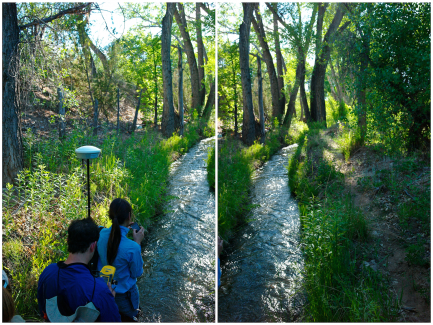Citizen-Scientists Launch EPA Grant

December 15, 2013
In Summer 2013, ALI launched Embudo Agua Limpia: An Updated Watershed-Based Plan for the Lower Embudo Watershed, New Mexico. A critical piece of the project team is the group of residents who stepped forward to serve as field monitors, trained to operate data-gathering instruments for field sampling. Valley-wide planning could not happen without intrepid citizens conducting this field work on the ground (and in the water). Read more.
Citizen-scientists don waders and safety lines to gather, measure, and report stream flows (volume) and sediment and turbidity (quality) in order to precisely locate the sources of greatest stress on the watershed’s streams. Determining total suspended sediment loads within the Rio Embudo is a critical first step in prioritizing watershed-scale water and soil erosion management strategies. Valley-wide planning could not happen without intrepid residents conducting this field work on the ground (and in the water).
In addition to the physical samples collected by citizen-scientists, fully automated in-stream stations relay data via satellite to remote partners. In July, Peter Arnold and ALI Research Intern Ethan Dingwell installed two research-grade water quality monitoring stations on the lower Rio Embudo. Shortly afterward, the National Oceanagraphic and Atmospheric Administration (NOAA) granted ALI a 5-year cooperative agreement for transmission of environmental monitoring data through the Geostationary Operational Environmental Satellite [GOES] network. Automated monitoring stations feature in-stream optically-sensed turbidity meters, water pressure sensors, water temperature, rain gauge and transmitters for NOAA satellite telemetry.
Community surveys and stream-monitoring data will be integrated with land cover, soil loss, and remote sensing data to produce high-resolution geospatial models. Community review of maps and models will inform feasibility assessments and a prioritization process, addressing the valley's most urgent water-quality and land-use issues. Over two years, this project will:
• Provide science-based, quantitative information on specific pollutant loads;
• Identify and characterize surface water impairments;
• Develop prioritization methods for action; and
• Identify specific management measures for reducing or eliminating the flow of pollutants in impaired stream systems.
ALI invites all interested citizens, commissioners and parciantes to help this effort over the next two years. We seek responsible community members wishing to contribute at any level, from participating in occasional workshops to serving as trained members of field sampling teams. Please feel free to contact us with questions you may have about this project.
Embudo Agua Limpia is funded by the US Environmental Protection Agency, Clean Water Act Section 319 (h) and New Mexico Environmental Department, Surface Water Quality Bureau.
Recent posts
February 15, 2018
February 12, 2018
February 12, 2018
Archives
- July 2020 (1)
- February 2018 (4)
- August 2016 (1)
- July 2016 (3)
- April 2016 (1)

